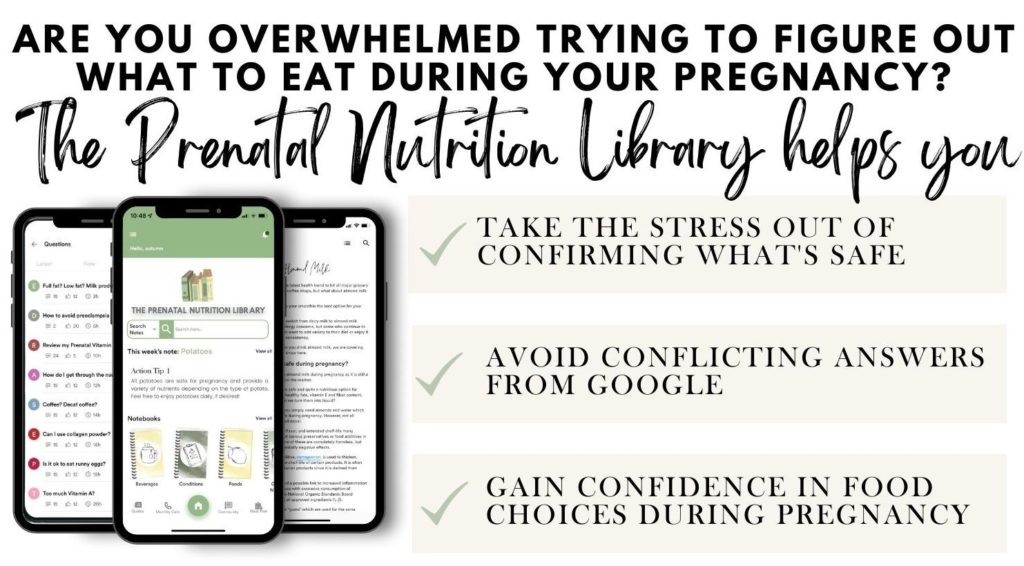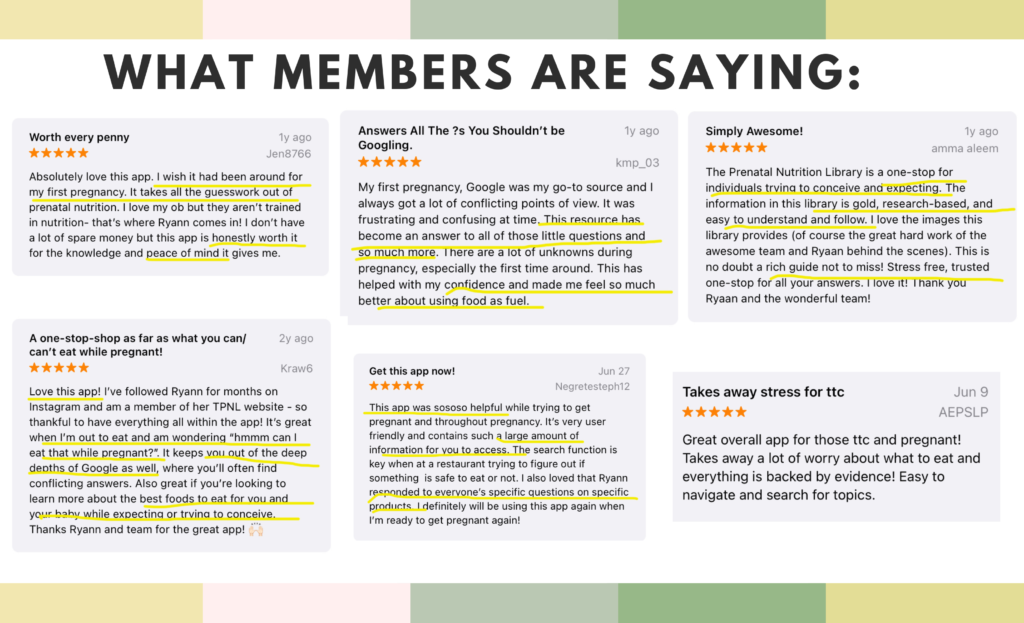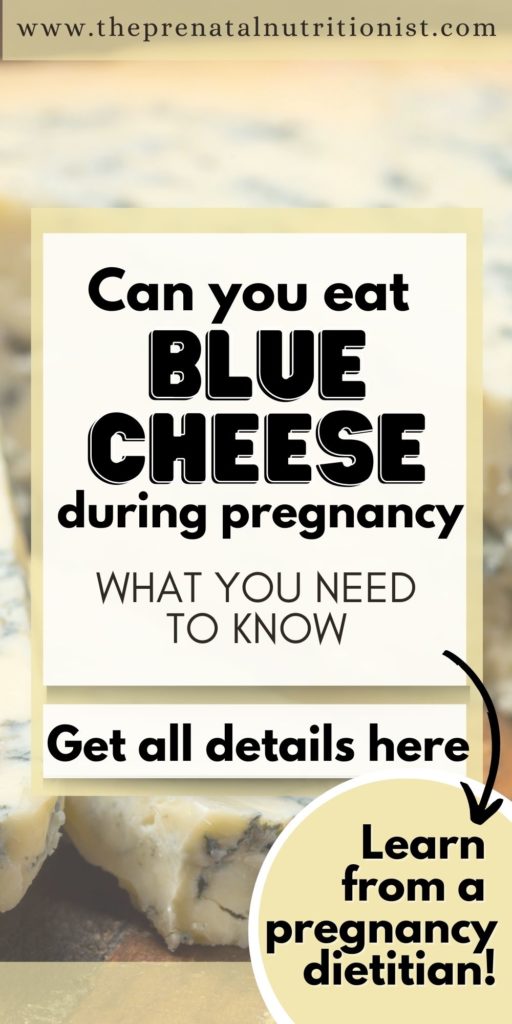
Blue cheese is one of the most popular cheeses in the world. It is delicious, nutritious, and oh-so flavorful. Made from cow’s milk, sheep’s milk, or goat’s milk, this aged cheese has a distinct salty and sharp taste, making it popular among food enthusiasts.
Cheese lovers enjoy mixing it in salad dressings, sauces, and other dishes. Are there potential risks to eating blue cheese, as well as Danish blue cheese, when you are pregnant?? I created this post to help you become more informed about this food and whether or not it is really safe to consume when you’re expecting.
If you’ve been craving blue cheese or wondering if it is safe to consume this dairy product during pregnancy, read more below to find out.
For more information on dairy and pregnancy, see my roundup of the best dairy for pregnancy.
Can You Eat Blue Cheese While Pregnant?
The short answer is yes, it can be. Let’s take a closer look at the nuances in this discussion because, interestingly enough, not all countries governing bodies agree on the safety of soft blue cheese during pregnancy.
This pungent variety of cheese stands apart from other types of cheese primarily due to its distinctive blue or green veins that run through its creamy white or pale yellow body. These are from mold cultures, such as Penicillium roqueforti or Penicillium glaucum, which are added during production. I know that can sound “gross,” but the mold is what gives it that robust flavor profile! It also wouldn’t be blue cheese without these molds. Remember, this is not the mold we see on moldy bread, for example.
Blue cheese comes in many different varieties. There are also both hard blue cheeses and soft blue cheeses. It’s common to find blue cheese in sauces, dips, and dressings too. Hard blue cheeses that are pasteurized are safe to consume during pregnancy. This includes varieties such as Stilton, blue cheese crumbles, and Danish blue cheese.
Soft blue cheese is a bit more controversial, and where some countries’ guidelines disagree. However, in the United States, the recommendation is that all types of soft cheese, including soft blue cheeses, brie camembert, and mould ripened soft cheeses, are safe as long as they are pasteurized. Whatever you choose, it is best practice to stick with pasteurized blue cheese options during pregnancy.
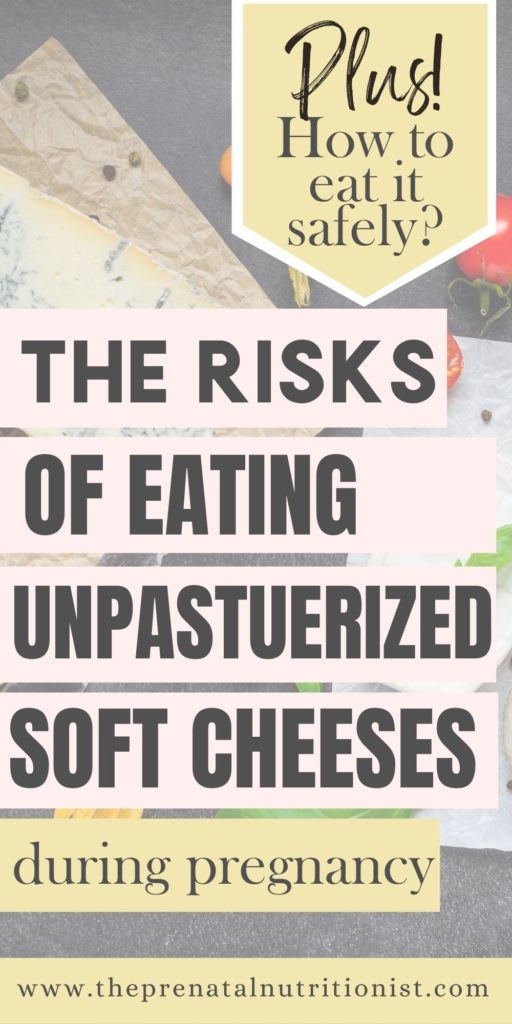
What Could Happen If You Eat Unpasteurized Blue Cheese While Pregnant?
Eating blue cheese while pregnant can be a nutritious and delicious choice. Still, many have the question, why is choosing pasteurized options important? What is the risk of eating unpasteurized soft cheese? Below are some of the potential risks of eating unpasteurized soft cheese. Remember, eating unpasteurized cheese doesn’t mean you WILL get sick. There’s just an increased risk since it has not undergone the heat-treating process.
Listeriosis
Unpasteurized soft blue cheese can be potentially unsafe during pregnancy due to the risk of contamination with Listeria monocytogenes, a type of bacteria that can cause listeriosis. Unlike other bacteria, listeria bacteria can get to the fetus quickly and cause harm. Listeriosis is rare, but it is serious. Pregnant women have a higher risk of infection. This is because your immune system is slightly suppressed during pregnancy. If you think you might have a listeria infection, contact your healthcare provider.
Learn about how to strengthen your immune system during pregnancy HERE!
Pregnancy Complications or Miscarriage
As the baby is carried in the uterus, infections like listeria pose a greater risk to pregnant women as they can cross the placenta and harm the developing baby. This could lead to severe complications or leading to miscarriage in the worst cases.
Blood infections or Meningitis
Please know this is extremely rare. In the worst-case scenarios, bacteria present in raw and unpasteurized dairy could lead to blood infections or even meningitis. This a very serious condition.
Gastrointestinal symptoms
When infected with foodborne illness, symptoms can range from an upset stomach, bloating, and gas to nausea, diarrhea, and vomiting. Gastrointestinal issues can also impact nutrient absorption. Be sure to call your doctor immediately if you believe you have symptoms of foodborne illness.
Is Blue Cheese Pasteurized?
It is possible for blue cheese to be made with raw and unpasteurized milk. Most commercial, store-bought blue cheese and blue cheese products will be pasteurized. When unpasteurized blue cheese is sold in stores, it’s aged for a period of time to help reduce the risk of bacteria. The aging process of blue cheese can help eliminate or reduce bacteria, including Listeria, but it may not completely eliminate the risk. It’s more common to find unpasteurized blue cheese in places like a farmer’s market or local health food stores. Remember, it is still possible to get sick from eating any pasteurized cheese if basic food safety practices are not practiced.
If you are pregnant, opt for pasteurized versions to minimize the potential risk of bacterial contamination. Remember, this doesn’t mean eating unpasteurized cheese or dairy products WILL make you sick. It’s just an increased risk.
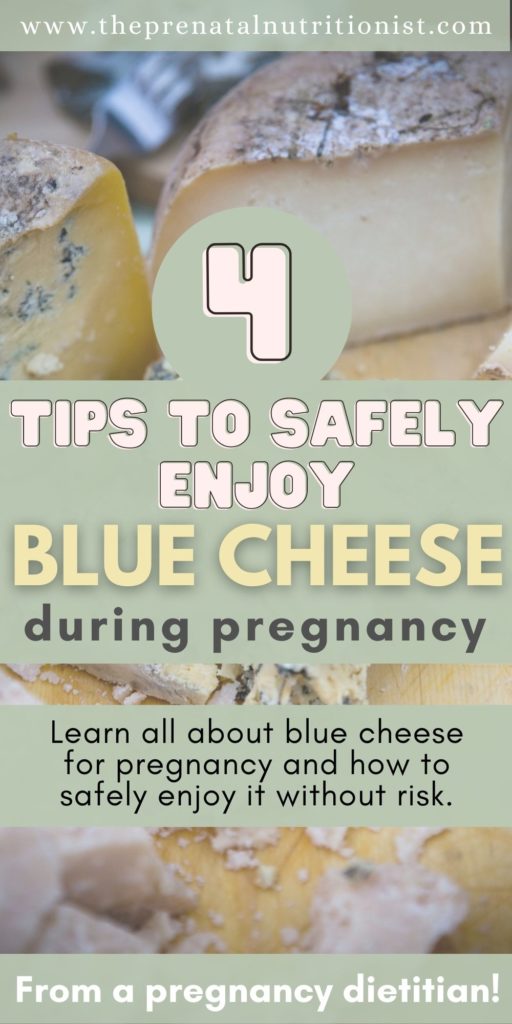
Tips For Eating Blue Cheese While Pregnant
If you’re a cheese lover who wants to indulge while pregnant safely, here are some tips to help you eat blue cheese safely.
Always check the labels.
Never forget to check the labels! Take some time to read carefully and choose blue cheese products that are made from pasteurized milk. Also, check expiration dates and avoid spoiled blue cheese.
Practice good food safety hygiene.
Store your blue cheese properly in the fridge. Ensure it is tightly wrapped in a silicone bag, plastic wrap, a zip-lock bag, or parchment paper. Store it in the crisper drawer of your fridge. This helps to keep the cheese from drying out.
Cook your blue cheese.
Heating up your blue cheese to 165°F will help eliminate harmful bacteria. Note that cheeses have a high-fat content and strong flavors that can intensify when heated. You can’t go wrong with a buffalo chicken lasagna or a meat and blue cheese pizza.
Choose commercially made blue cheese products.
Blue cheese dressings and sauces found in the grocery store will typically be pasteurized and safe for pregnancy. If having a homemade option, don’t be afraid to ask questions!
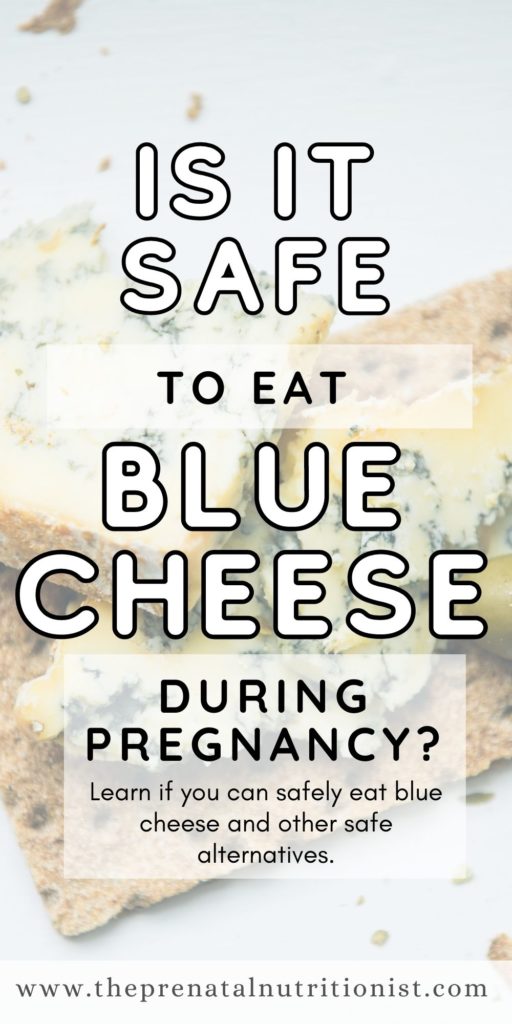
Blue Cheese Alternatives
Remember, if you find yourself craving blue cheese, that’s totally fine! Just be sure to choose a pasteurized option. If you don’t love blue cheese or want to change it up for any reason, numerous substitutes for blue cheese can easily satisfy your taste buds.
Gouda cheese
Gouda cheese is a popular pregnancy-safe alternative to blue cheese. It is known for its creamy, buttery flavor and smooth texture, making it a crowd-pleaser all around. Gouda is a semi-hard to hard cheese, which means it has less moisture and is less likely to grow bacteria. It is packed with protein, calcium, and vitamin B12, which are all essential for the healthy development of your baby. You can enjoy Gouda in a variety of ways. Slice it up for a cheese platter, melt it over a grilled sandwich, or grate it into a comforting mac and cheese.
Cheddar cheese
Another great alternative is cheddar cheese. This versatile cheese, which has a creamy and tangy flavor, not only satisfies your cravings but also provides a heap of nutritional benefits like protein, calcium, and fats. It also comes in different sharpness varieties, which gives you more options to choose from. Cheddar cheese goes perfectly with sandwiches, salads, tacos, casseroles, and more.
Cream Cheese
Cream cheese is also a safe substitute. Although it is typically more spreadable, it is versatile and easy to use. With original cream cheese having a mild flavor, you can also enjoy the many flavors of cream cheese.
Want more alternatives? Check out my previous post about pregnancy-safe cheese boards!
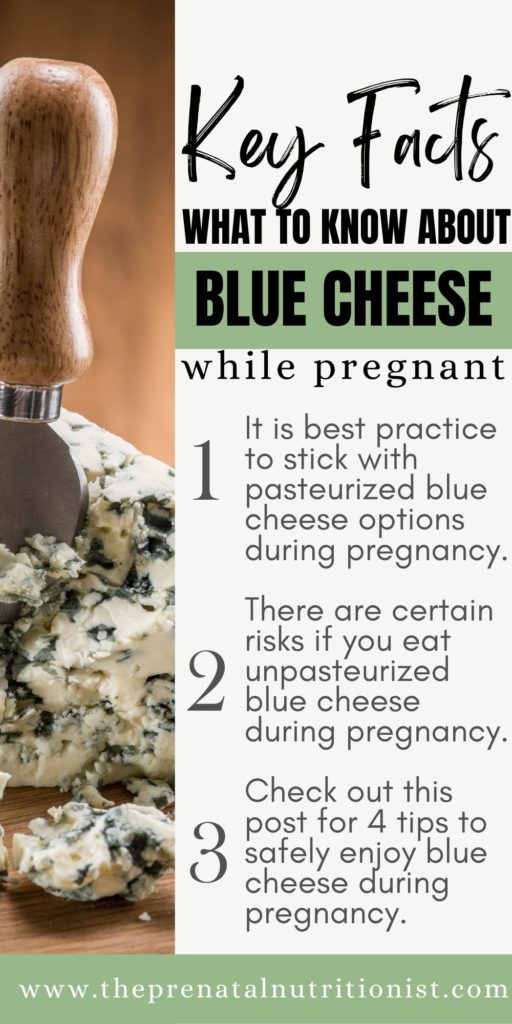
So, is it safe to eat blue cheese while pregnant?
The short answer is: it depends. Blue cheese made from pasteurized milk is generally safe to eat. In contrast, it’s best to avoid unpasteurized blue cheese. Check your food labels when purchasing blue cheese to look for pasteurized options. Pasteurization helps to reduce the risk of food containing harmful bacteria like Listeria.
To ensure that you and your growing baby are safe from potential health complications, practice caution when purchasing blue cheese. First, read labels and choose products that use pasteurized milk. Then, store your blue cheese properly. Heating it, i.e., eating it in a cooked dish, is also completely safe. It’s perfectly okay to indulge in your favorite soft cheeses during pregnancy as long as you ensure you are eating pasteurized options.
I hope this simple guideline gives you more insight into whether eating blue cheese is safe or not for pregnant women! Don’t forget other safe cheese options like cheddar cheese, parmesan cheese, queso fresco, gouda cheese, or cream cheese. Remember to always consult with your doctor if you think you have symptoms of foodborne illness.
For more expert guidance on all things prenatal nutrition and what is safe to eat during pregnancy, join The Prenatal Nutrition Library. It’s the most comprehensive library of prenatal nutrition information available and the first searchable app for food during pregnancy. Download the app here!! See you inside!


